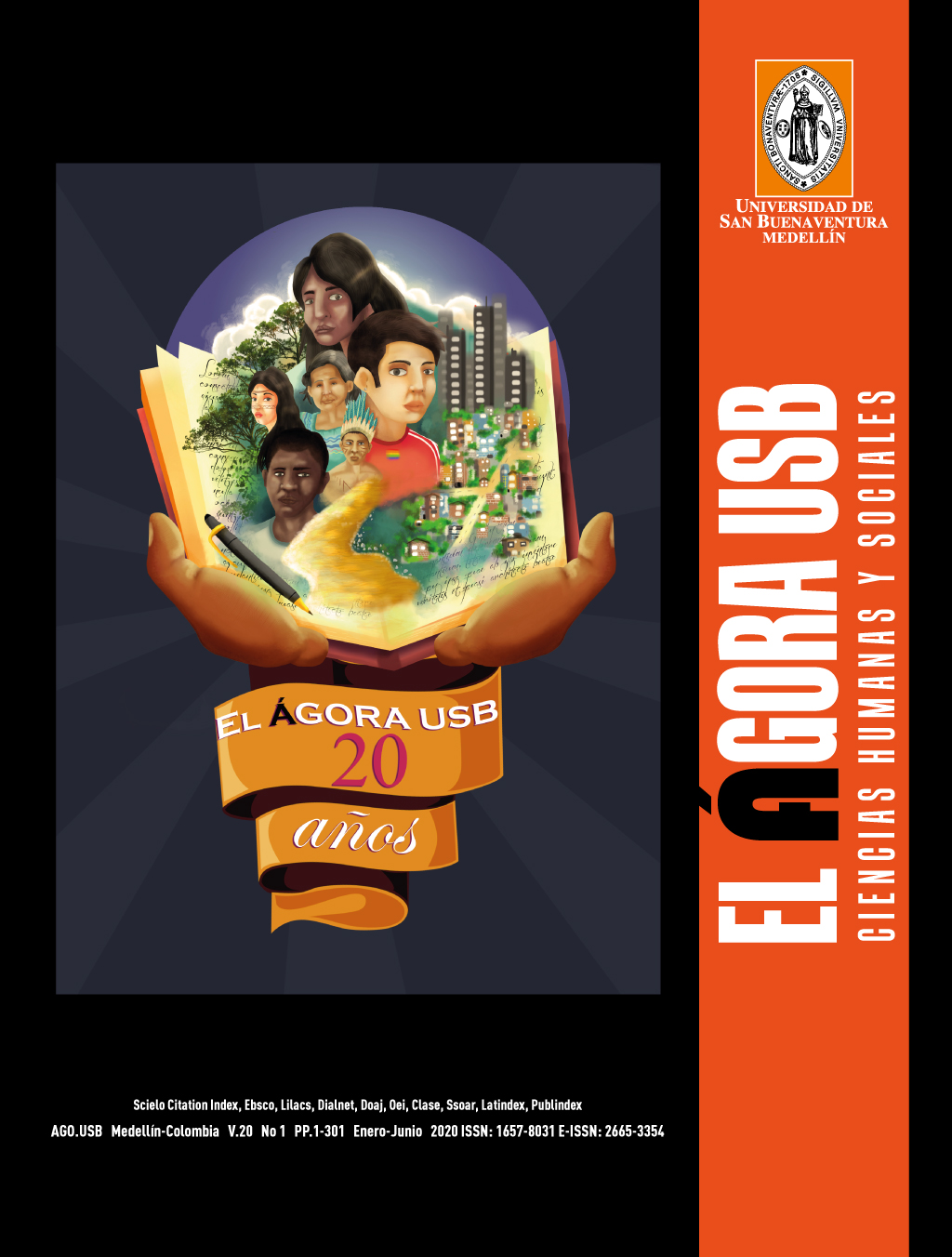The authors are also adhere to the creative commons license 4.0 (https://creativecommons.org/licenses/by-nc-nd/4.0/deed.es)
Attribution - NonCommercial - SinDerivar 4.0 International (CC BY - NC - ND 4.0)
Abstract
By analyzing the Route of Reintegration of the Agency for Reintegration and Standardization (ARN) for senior citizens in Colombia, who have been part of illegal armed groups and initiate processes of reintegration into the civilian life, in the Colombian State, it is evident, on the one hand, that this population is especially vulnerable as they have more difficulty adapting to the civilian life. It warns of the need to recognize the gaps that require particular conditions and needs of this population group. It further stresses the importance of increasing and/or improving the public and private offer of services, which allow comprehensive and sustainable care.
Keywords:
References
Reintegraci%C3%B3n%20Fortaleza%20Institucional%20basada%20en%20la%20experiencia%20y%20lecciones%20aprendidas.pdf
Agencia Colombiana para la Reintegración. (24 de junio de 2016). Resolución número 1356 de 2016. Recuperado de https://www.ambitojuridico.com/BancoMedios/Documentos%20PDF/res-1356-16(acr).pdf
Agencia Colombiana para la Reintegración. (2017). Dimensiones de la Ruta de Reintegración. Conceptualización, logros, metas y categorías de avance. Bogotá: ACR.
Agencia para la Reincorporación y la Normalización. (2018). ¿Qué es la Reintegración? Recuperado de
http://www.reintegracion.gov.co/es/la-reintegracion/Paginas/quees.aspx
Almedom, A. M. (2004). Factors that mitigate war-induced anxiety and mental distress. Journal of Biosocial Science, 36(4), 445-461.
Baaz, M. E., & Stern, M. (2008). Making sense of violence: Voices of soldiers in the Congo (DRC). The Journal of Modern African Studies, 46(1), 57-86.
Beaglehole, R., Epping-Jordan, J., Patel, V., Chopra, M., Ebrahim, S., Kidd, M., & Haines, A. (2008). Improving the prevention and management of chronic disease in low-income and middle-income countries: a priority for primary health care. The Lancet, 372(964).
Bragin, M. (2010). Can anyone here know who I am? co-constructing meaningful narratives with combat veterans. Clinical Social Work Journal, 38(3), 316-326.
Congreso de Colombia. (21 de enero de 2013). Ley 1616, por medio de la cual se expide la ley de salud mental y se dictan otras disposiciones. Recuperado de https://www.minsalud.gov.co/sites/rid/Lists/BibliotecaDigital/RIDE/DE/DIJ/ley-1616-del-21-de-enero-2013.pdf
CONPES. (2008). CONPES 3554 de 2008: Política Nacional de Reintegración Social y Económica para personas y grupos armados ilegales. Bogotá. Recuperado de https://www.dnp.gov.co/CONPES/Paginas/conpes.aspx
Devkota, B., & van Teijlingen, E. (2010). Understanding effects of armed conflict on health outcomes: The case of Nepal. Conflict and Health, (4), 1-8.
Fedesarrollo y Fundación Saldarriaga Concha. (2015). Misión Colombia envejece. Cifras, retos y recomendaciones. Bogotá: Fundación Saldarriaga Concha.
Herrera, D., y González, P. (2013). Estado del arte del DDR en Colombia frente a los estándares internacionales en DDR (IDDRS). Colombia Internacional(77), 272.302.
Korinek, K., & Teerawichitchainan, B. (2014). Military service, exposure to trauma, and health in older adulthood: An analysis of northern vietnamese survivors of the Vietnam war. American Journal of Public Health, 104(8), 1478-1487.
Luitel, N. P., Jordans, M. J., D., S. R., Tol, W. A., Kohrt, B. A., Thapa, S. B., & Sharma, B. (2013). Conflict and mental health: A cross-sectional epidemiological study in Nepal. Social Psychiatry and Psychiatric Epidemiology, 48(2), 183-193.
Matanov, A., Giacco, D., Bogic, M., Ajdukovic, D., Franciskovic, T., Galeazzi, G. M., & Priebe, S. (2013). Subjective quality of life in war-affected populations. BMC Public Health, (13), 624.
Mejía, L. (2016). Lo psicosocial en el marco del proceso de reintegración social y económico de personas y grupos alzados en armas (pp. 35-49). En: ACR (ed.), Anuario de Reintegración 2016: La ACR a la vanguardia del postconflicto. Bogotá D. C.: Autor.
Mendoza, J., y Rivera, G. (2015a). Componente etario. Lineamiento de atención a la persona mayor. Documento inédito de la ACR y la OIM, Bogotá.
Mendoza, J., y Rivera, G. (2015b). Diagnóstico poblacional: personas mayores en proceso de reintegración. Documento inédito de la ACR y la OIM, Bogotá.
Mendoza, J., y Rivera, G. (2015c). Estado del arte personas mayores y procesos de DDR. Documento inédito de la ACR y la OIM, Bogotá.
Ministerio de la Protección Social. (2011). Directriz de Enfoque Diferencial, para el Goce efectivo de los derechos de las Personas Mayores en situación de desplazamiento forzado en Colombia. Bogotá: Autor.
Montero, M. (2004). Introducción a la psicología comunitaria. Desarrollo, conceptos y procesos. Buenos Aires: Paidós.
Nakayama, R., Koyanagi, A., Stickley, A., Kondo, T., Gilmour, S., Arenliu, A., & Shibuya, K. (2014). Social networks and mental health in post-conflict Mitrovica, Kosovo. BMC Public Health(14), 1169.
ONU. (2012). Participación de las mujeres en las negociaciones de paz: relaciones entre presencia e influencia Organización Internacional del Trabajo. (2002). Una sociedad inclusiva para una población que envejece: el desafío del empleo y la protección socia. Madrid: OIT.
Preston, R. (1997). Integrating fighters after war: Reflections on the Namibian experience, 1989-1993. Journal of Southern African Studies, 23(3), 453-472.
Rodríguez, J. (2016). La participación de las mujeres desmovilizadas en la construcción de la paz en Colombia (pp. 93-98). En: ACR (ed.), Anuario de Reintegración 2016: La ACR a la vanguardia del postconflicto. Bogotá: Autor.
Schubotz, D., Melaugh, M., & McLoughlin, P. (2011). Archiving qualitative data in the context of a society coming out of conflict: Some lessons from Northern Ireland. Qualitative Social Research, 12(3), Art. 13.
Somasundaram, D., & Sivayokan, S. (2013). Rebuilding community resilience in a post-war context: Developing insight and recommendations - a qualitative study in northern Sri Lanka. International Journal of Mental Health Systems, 7(3).
Spiegel, P., Checchi, F., Colombo, S., & Paik, E. (23-29 de Jan de 2010). Health-care needs of people affected by conflict: future trends and changing frameworks. The Lancet, 375(9711), 341-345.
Wilmer, F. (1998). The social construction of conflict and reconciliation in the former Yugoslavia. Social Justice, 25(4), 90-113.

 Perfil Google Scholar
Perfil Google Scholar



















